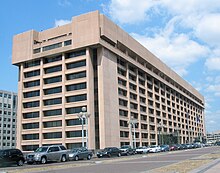US Mail
|
Logo used since 1993
|
|
 USPS headquarters |
|
| Agency overview | |
|---|---|
| Formed | July 1, 1971 Washington, D.C., U.S. |
| Type | Independent |
| Headquarters |
475 L'Enfant Plaza SW Washington, D.C. 20260-0004 |
| Employees | 639,789 (508,908 career, 130,881 non-career) as of September 30, 2016 |
| Agency executives |
|
| Key document | |
| Website | www |
The United States Postal Service (USPS; also known as the Post Office, U.S. Mail, or Postal Service) is an independent agency of the United States federal government responsible for providing postal service in the United States, including its insular areas and associated states. It is one of the few government agencies explicitly authorized by the United States Constitution.
The U.S. Mail traces its roots to 1775 during the Second Continental Congress, when Benjamin Franklin was appointed the first postmaster general. The Post Office Department was created in 1792 from Franklin's operation, elevated to a cabinet-level department in 1872, and transformed in 1971 into the U.S. Postal Service as an independent agency.
The USPS as of February 2015 has 617,254 active employees and operated 211,264 vehicles in 2014. The USPS is the operator of the largest civilian vehicle fleet in the world. The USPS is legally obligated to serve all Americans, regardless of geography, at uniform price and quality. The USPS still has exclusive access to letter boxes marked "U.S. Mail" and personal letterboxes in the United States, but now has to compete against private package delivery services, such as United Parcel Service and FedEx.
Since the early 1980s, many of the direct tax subsidies to the Post Office (with the exception of subsidies for costs associated with the disabled and overseas voters) have been reduced or eliminated in favor of indirect subsidies, in addition to the advantages associated with a government-enforced monopoly on the delivery of first-class mail. Since the 2006 all-time peak mail volume, after which Congress passed the Postal Accountability and Enhancement Act (which mandated $5.5 billion per year to be paid into an account to fully prefund employee retirement health benefits, a requirement exceeding that of other government and private organizations), revenue dropped sharply due to recession-influenced declining mail volume, prompting the postal service to look to other sources of revenue while cutting costs to reduce its budget deficit. The USPS lost $5.5 billion in fiscal year 2014 , $5.1 billion in 2015, and $5.6 billion in 2016 and its revenue was $67.8 billion in 2014 and $68.9 billion in 2015.
...
Wikipedia
